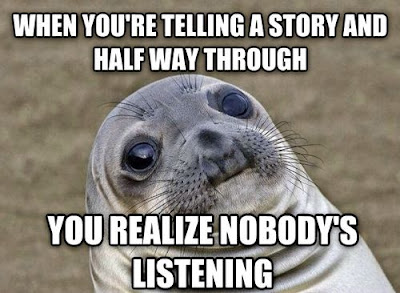I have found something that most people I know have in common - we are all terrible at listening. It is too strong a temptation to think the conversation is all about us.
Person 1: My cat died.
Person 2: I don't have a cat.
My sister and I recognized this tendency in ourselves years ago, so every now and again, when we noticed each other doing it, we would say meaningfully, "I don't have a cat."
How often have I asked a question and completely missed the answer because I was busy following my own train of thought?
How often have I only caught the beginning of the answer, and then switched off as I began to construct my rebuttal or my own related funny story?
How often have I breathlessly waited for the other person to pause so I can jump in with MY much funnier and more interesting take on the subject?
Sometimes I think of a conversation as a game of catch or throwball (my school's version of volleyball). It's supposed to go back and forth. But too often I or the other person grab the ball and start running in the opposite direction. Even though I know my tendency to do this, I still often make the same mistakes. However I am trying, and am a little better than I used to be.
Here are a few things I found helpful-
1. Echo and ask follow up questions: Obviously don't just repeat back the exact thing the other person just said, but if you're having a hard time focussing, try to pick up SOMETHING the other person said, and check that's what they were saying. "So you are finding your job stressful?" And then follow up, "Do you think it's because of the timings? Or are there other factors?"
2. Watch people's faces: It's easy to tell when I've been hogging the conversation ball, because people stop responding, start getting a blank look on their faces, and stop saying anything.
3. Look out for open mouths: Sometimes people want to say something but they won't grab the ball as aggressively as others. They open their mouth to say something, but don't follow up if someone else keeps talking. So when I see that, whether it's in a one-on-one conversation or a group conversation, I need to stop and say, "You were about to say something?"
4. Consciously choose to give up a story: Sometimes I have the best story ever. And I just KNOW it's going to get a laugh. Or I have a great, original thought that would be a wonderful addition to the conversation. And I just feel like I MUST get it in one way or another. But you know what? I really don't need to. My stories and opinions are really not AS amazing as I think they are. (And if I MUST share them, I can always blog 😄)
5. Give up the addictive need to be right: Not everything has to turn into a debate. Listen to understand, not to make a point. It's easy to tell at the end of a conversation whether it was fruitful or frustrating.
6. Remember that listening is love: What a simple way to make people feel loved. When I think of people who have really listened to me, been genuinely interested in my life, and asked good questions, I remember feeling loved.
7. Humbly admit when you fail: I have had to often apologize for talking too much. Or say, "I'm so sorry but I didn't catch your name." Or "I know I should know this by now and you've probably told me, but what is it you do again?"
8. Try again: I don't need to beat myself up every time I fail. I'm not a horrible person, I just have a weakness which I'm working on.
I've seen how each time I make a little effort to grow in this area, it blesses someone, opens up a space for REAL communication, and fellowship. Everyone needs to be heard. But very few are really listening.







This is actually relatable! We keep babbling with people all the while, never really making sensible and worthwhile conversations. This was really helpful. Thank you so much for this!
ReplyDeleteAs usual, this felt very apt for what people have been saying about me and my lack of listening these days. Thank you, Suzy!
ReplyDelete